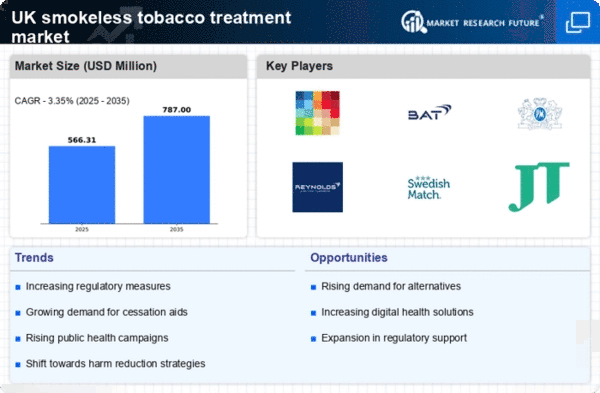Changing Social Norms
Shifting social norms regarding tobacco use are contributing to the growth of the smokeless tobacco-treatment market. As societal attitudes increasingly view smokeless tobacco use as unacceptable, individuals may feel pressured to quit. This cultural shift is particularly evident among younger generations, who are more likely to reject tobacco use altogether. Surveys indicate that nearly 40% of young adults in the UK believe smokeless tobacco is socially unacceptable, which may drive them to seek treatment options. As these changing perceptions take hold, the smokeless tobacco-treatment market is poised to benefit from a growing number of individuals motivated to abandon their habits.
Rising Health Awareness
The increasing awareness of health risks associated with smokeless tobacco use is a primary driver for the smokeless tobacco-treatment market. Public health campaigns in the UK have effectively highlighted the dangers of smokeless tobacco, leading to a growing number of individuals seeking treatment options. According to recent data, approximately 30% of smokeless tobacco users in the UK express a desire to quit, indicating a significant market potential. This heightened awareness is likely to propel the demand for cessation products and services, as individuals become more informed about the adverse health effects, including oral cancers and cardiovascular diseases. Consequently, the smokeless tobacco-treatment market is expected to expand as more users actively pursue healthier lifestyles and seek assistance in overcoming their addiction.
Government Initiatives and Support
Government initiatives aimed at reducing tobacco use play a crucial role in shaping the smokeless tobacco-treatment market. The UK government has implemented various policies, including funding for cessation programs and public health campaigns, which encourage individuals to quit smokeless tobacco. For instance, the National Health Service (NHS) provides resources and support for those looking to quit, which has been instrumental in increasing treatment uptake. In 2025, the government allocated £10 million to enhance smoking cessation services, which also encompass smokeless tobacco users. This financial backing not only raises awareness but also improves access to treatment options, thereby driving growth in the smokeless tobacco-treatment market.
Technological Advancements in Treatment
Technological advancements in treatment options are significantly influencing the smokeless tobacco-treatment market. Innovations such as mobile health applications and online support platforms have emerged, providing users with accessible resources to aid in quitting. These technologies offer personalized plans, tracking features, and community support, which can enhance the likelihood of successful cessation. In the UK, it is estimated that around 25% of users prefer digital solutions for quitting, indicating a shift towards technology-driven approaches. As these advancements continue to evolve, they are likely to attract more individuals to seek treatment, thereby expanding the smokeless tobacco-treatment market.
Increased Availability of Treatment Options
The increased availability of diverse treatment options is a significant driver for the smokeless tobacco-treatment market. In the UK, a variety of cessation products, including nicotine replacement therapies, prescription medications, and behavioral support programs, are now more accessible than ever. This expansion in treatment options caters to different preferences and needs, making it easier for users to find suitable solutions. Recent data suggests that the market for nicotine replacement therapies has grown by 15% in the past year, reflecting the rising demand for effective cessation aids. As more individuals become aware of these options, the smokeless tobacco-treatment market is likely to experience continued growth.

















Leave a Comment